Throughout my many years of death-related hoarding (I could have been into sports or socialising as a child. Junk shops have a lot to answer for.), I’ve accumulated quite the collection of letters on mourning stationery. Whether these are simple invitations to funerals, to dull notes about travel arrangements, I can’t help but surrender to this unrelenting urge to ‘rescue’ things. It’s a mindset I constantly fight – the idea that these things were once important to someone, and deeply personal to boot. Victorian sentimentality and mourning will forever be my Achilles heel – alongside the ritual and performance of grief in the 19th century, it’s the little things I can’t resist. From black-bordered letter paper to expressions of loss and condolence, they’re little snapshots of long-passed lives that I desperately need to squirrel away into shoeboxes until my house looks like a very depressing game of Jenga and I need to be rescued by the emergency services.
So, with all of that in mind, I thought it was high time that I shared a few of these letters in my collection. Considering that most of these haven’t been read in over a century, it feels like a great privilege to glimpse into the world of the Roe family in 1906.

Cheriton
De Cham Road
St Leonards-on-Sea
May 18th 1906
Dear Mr Saunders,
Having at last found an old letter of yours, I am enabled to perform, what is to me a very painful duty, in writing to inform you of the death of my poor brother William Roe. He died on Monday the 14th inst. after a long and painful illness brought on through [?] the diseased leg, from which he had suffered from so many years, and which at last, according to the doctor, poisoned the system to that extent, that at last he was unable to swallow anything. I do not wish to be tedious in telling at too great a length of his end, knowing that he must be as a stranger to you, but would say that for the last few months, he was only able to cross his room by crawling, so that is very true in his case, that it was a happy release from pain.
I have seen to it that he did not want, for of course he had nothing of his own. He rests now, where he began life, upon his mother’s breast, both in Old Hollington Church yard.
He seemed to have an aversion to speaking of anything about Southampton, especially to me. And he obliged to my writing at the last. He was lodging nearly a mile from my home. I never know of any letters that he ever received. We had a letter once, years ago, from Emmy, from Cape Town and we think a silly girl of ours destroyed it, before we were certain of her address, and I have always feared that our reply never reached her. He knows not whether there was any truth in the report, but Wm, her father always said, that she was drowned in the “Drummond Castle”. What knowledge he had of it, from any letter we don’t know, or if he went by the list in the paper, which he always kept. I only hope that it was not true.
I hope that your little family is quite well. Tell Mrs Saunders that all was done that could be and that it is a mercy that rest has come at last.
I remain
Yours Sincerely
George H Roe.

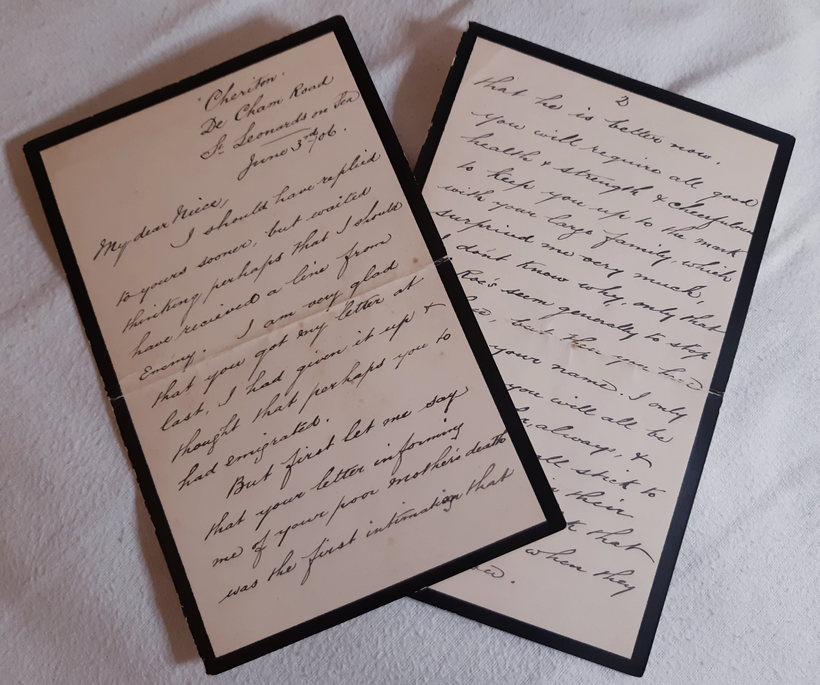
Cheriton
De Cham Road
St. Leonards on Sea
June 3rd 1906
My dear niece,
I should have replied to yours sooner, but waited thinking perhaps that. Should have received a line from Emmy. I am very glad that you got my letter at last. I had given it up and thought that perhaps you to have emigrated.
But first let me say that your letter informing me of your poor mother’s death was the first intimation [?] that I had received of it, and came as a shock to me. I am very sorry for you, sorry that more can not be said. I do not think that my brother could have possibly known of it, but I must tell you that for many years the subject of home was never mentioned between us, and indeed had scarce ever been, but I think that with his belief that Emmy was drowned, he stifled his thoughts as much as possible about it all.
Then he had all his pains to bare, which year by year grew worse. I do not think that in all the years since his return here, that he was ever properly able to do a full days work and so made very short time until he ceased altogether.
I only write this, that you may understand how things were. But I won’t write more about it, without you wish it. Still I ought to say that he seems to have kept every scrap of writing that he had received from home, and nice kindly written letters they all were.
They laid in his box where I found them, but I think the last of them was dated quite twenty years ago.
The debt of nature comes a little sooner or a little later, to each of us in turn. It seems very difficult to realise what changes time must have made with all of us. You, I seem to see as very much the same as when I last saw you, the same with Emmy. But with myself, some old pensioner would be nearest the mark and shaky at that.
I was very sorry to hear of your husband’s ill health of two years ago. I trust that he is better now. You will require all good health and strength and cheerfulness to keep you up to the mark with your large family, which surprised me very much. I don’t know why, but the Roe’s seem generally to stop at three, but then you have changed your name. I only hope that you will all be happy together, always, and that they will all stick to mother and father in their affections. I think that is more likely when they are near you.
My oldest boy, George, is not 27 years. He is an architect and in the London County Council’s office. Long may he remain there. (I mean in that office)
Lily, the second, is at home. Arthur, the youngest, now 22 years old, was in London for three years, pupil to a quantity surveyor, and just as he was prepared to start on was pulled down to a shadow. London didn’t agree with him, so he was sent home to lay on his back for three months, before he was allowed to get up. Now he has a craze to go and learn farming, so we have got him over to a farm about 15 miles from here, so that he can easily come home of a Saturday, and I am very thankful to say that he lasts in capital health again. The country air has done it for him.
And now with kindest love to you all from myself and wife, and best wishes for your happiness.
I remain
Your affectionate Uncle
George


Cheriton
De Cham Road
St. Leonard’s-on-Sea
Dec – 26th-06
Dear Fanny
I feel that I ought to send a line, owing to something you said about thinking that I had not written, because something had offended me.
Of course that was not the case, I simply thought that it would be best to let all tings rest belonging to the past and so I had nothing ese to write about. I hope that you are all well and enjoying the Christmas season. I enclose a little card written by your namesake who is living at Peckham. She is your second cousin and my first, being the daughter of the late Henry Roo, my uncle. [shame?] to say, we have written to each other at times for many years but I have never seen her. We have all our little family at home now but they are all busy in their separate ways.
Accept our kindest love and best wishes for the coming year, and remain your affectionate uncle,
George H Roe


Cheriton as it is today – the central house with the black door
So what do we know? The writer of the letters is George H Roe, born in 1838. Born in Newport on the Isle of Wight, he eventually settled in Hastings where he and his family settled into a comfortable middle-class lifestyle thanks to George’s building trade. When George was writing these letters, he was living at ‘Cheriton’ on De Cham Road in St Leonards on Sea. Sadly, the names of these 3-storey houses are no longer used and presumably lost with the gateposts that once sat by the roadside. However, it seems that ‘Cheriton’ is now simply number 11, De Cham Road – a substantial five-bedroom terrace that seems to have magically escaped being converted into flats.

George’s father was also called George (b.1807), which I think is categorically stupid. (I have special permission to say this as three generations of my family are all called Kenneth; a choice that baffles me to this day…) His mother, Harriet, was born in 1806 and was eventually laid to rest at the aforementioned Old Hollington Church yard. Old Hollington church is better known as ‘The Church in the Wood’ and is a stunning little secluded 13th century church that looks to be a beautiful place to spend eternity if I do say so myself.
But what of poor William Roe – the man whose death started these letters? George’s only brother William was born in the Isle of Wight in 1833 and followed his brother over to the mainland. He was a painter by trade and in 1881, was living at 11 Mount Place, Southampton.

We can’t be sure how he obtained such debilitating injuries, or how he came to be so distanced from his family, but his life seemed to be a solitary and painful one. He and his wife Eliza had two children – Fanny Roe (b1860) and Emily Roe (b1864). Emily Roe is known as ‘Emmy’ in George’s letters – the woman suspected of drowning in the ‘Drummond Castle’ – something that confused me a little.

Colour me stupid, but my first thought was a lake or a body of water near a literal castle…such as the 15th century Drummond Castle in Perthshire. Instead, he was referring to the SS Drummond Castle, built in 1881 and which ran aground and sank in 1896. The ship departed Cape Town on 28th May 1896, heading for London with 143 passengers and 102 staff on board. At 11pm on 16th June, the ship struck rocks between Ushant and Molène and sank within 4 terrifying minutes. Of 245 souls on board, only three survived.

Two crew members were rescued by passing fisherman and one passenger managed to swim to shore. The cause of the collision was regarded as due to ‘careless or unskilful navigation’. Emmy, thankfully, was not on board. Emmy had married in 1885 and moved to Southampton where she went on to live a long and happy life. Oh, and farming didn’t suit young Arthur after all – he soon returned to quantity surveying.
While not the cheeriest of tales, it’s a snapshot of grief and reunion that I find to be rather powerful indeed. And, should I ever find myself on the south coast, I’ll be sure to give them a visit.
***
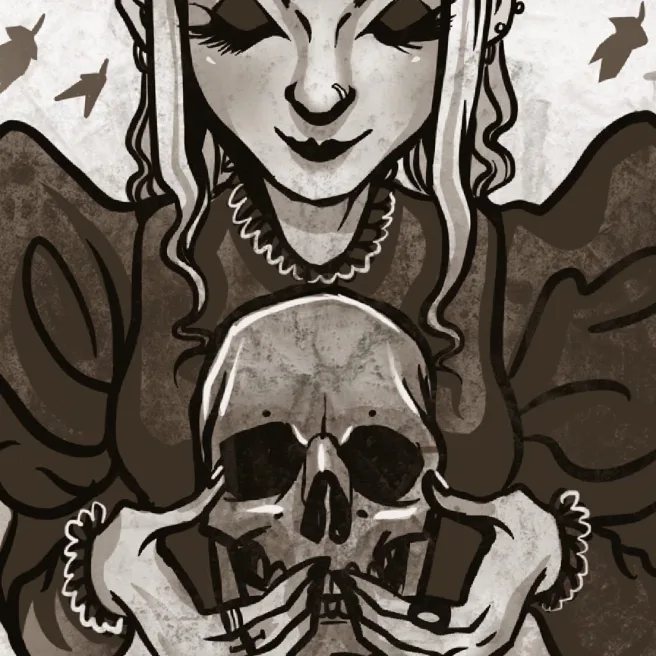
Liked this post? Then why not join the Patreon clubhouse? From as little as £1 a month, you’ll get access to tonnes of exclusive content and a huge archive of articles, videos and podcasts!
Pop on over, support my work, have a chat and let me show you my skulls…www.patreon.com/burialsandbeyond

Liked this and want to buy me a coffee?
To tip me £3 and help me out with hosting, click the link below!
https://ko-fi.com/burialsandbeyond
***

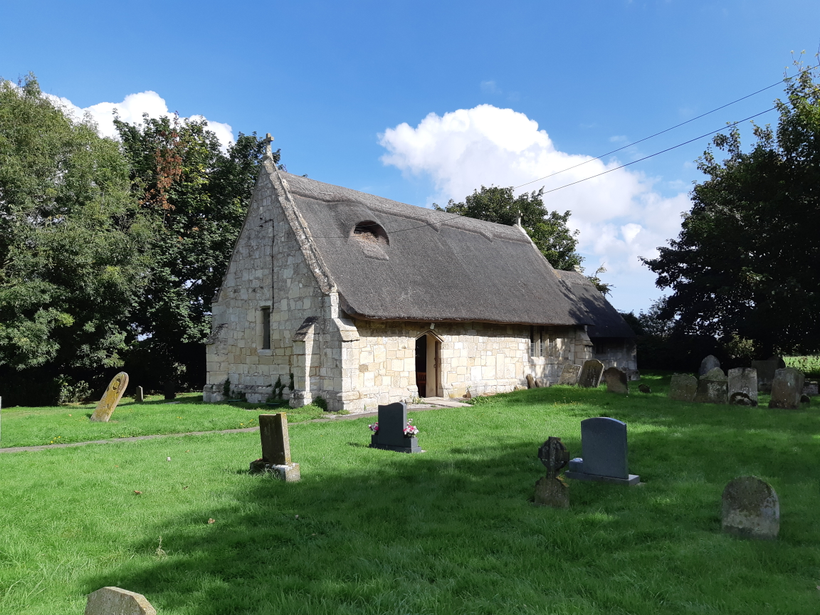
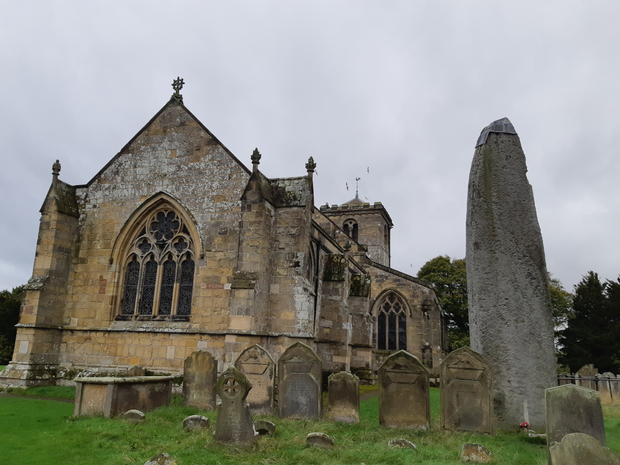
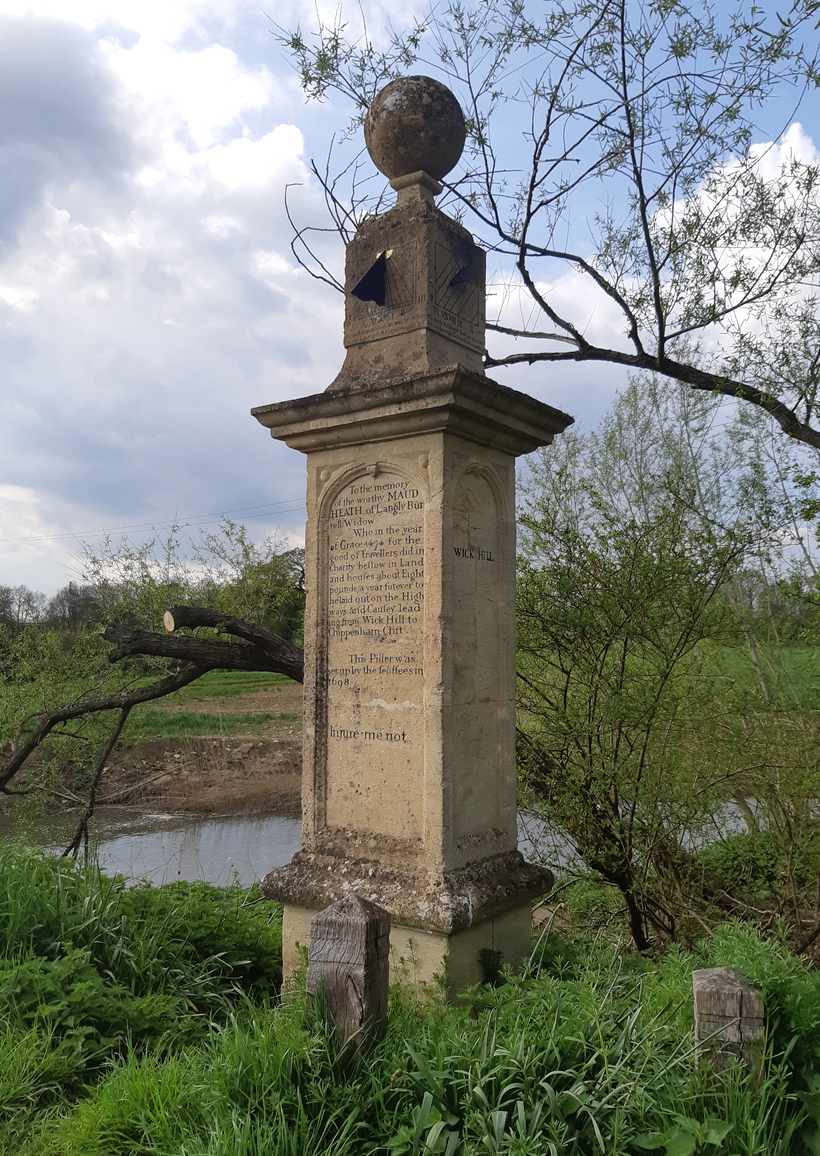
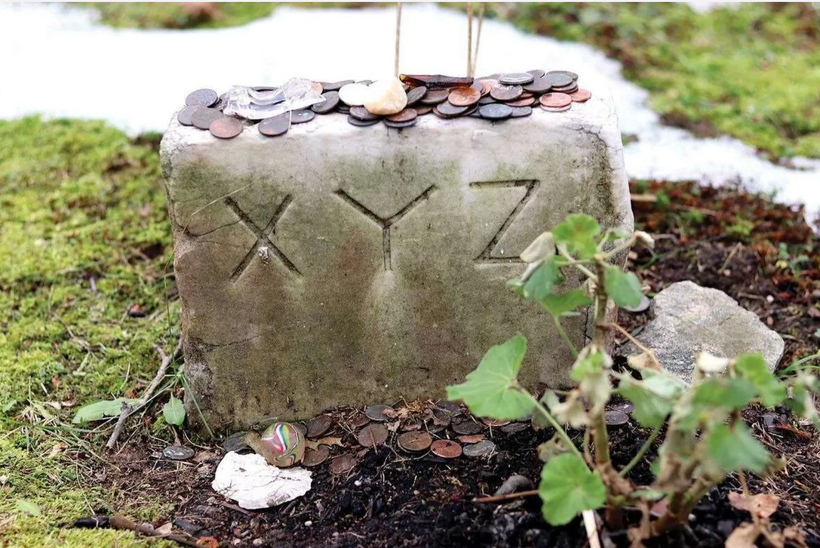
Leave a comment